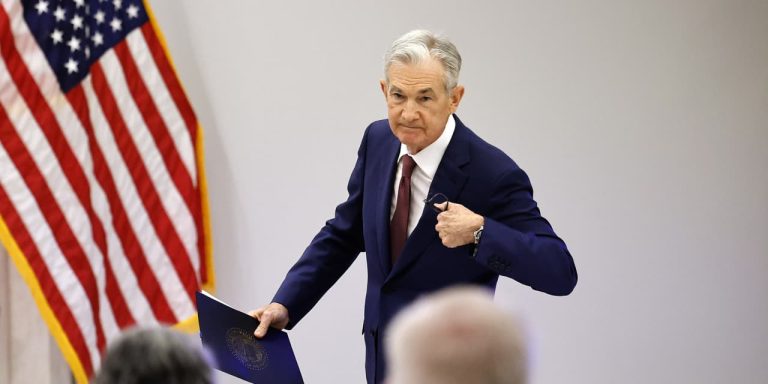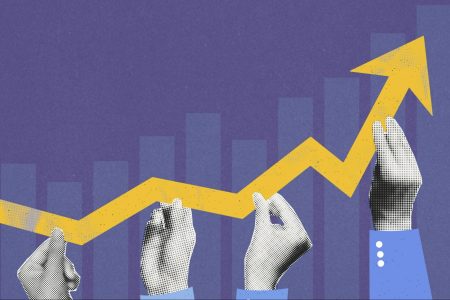Fed Chairman Jerome Powell said last week price growth has given the central bank “a few head fakes.”
Chip Somodevilla/Getty Images
The latest round of economic data left investors optimistic that inflation was falling, the economy was moderating, and the Federal Reserve was done with rate hikes.
The Fed’s response: not so fast.
Central bank policy makers have flooded the airwaves and speakers circuit in recent days to highlight how much uncertainty remains around the pathway forward. They cautioned there could be further tightening if the economic data merits it.
While the October data has shown the economy moving in the direction the Fed wants to see—particularly with headline price growth slowing to a 3.2% annual pace—the message has been that it is too early to declare mission accomplished.
“Just like I wouldn’t overreact if things went in the direction that we weren’t looking for, I don’t overreact if we get some promising news,” Boston Fed President Susan Collins told CNBC in an interview Friday.
While goods inflation has shown progress, it is still unclear whether the moderation on housing prices will be sustained, and there is more to do on non-shelter services, Collins said.
“We need to be patient and resolute,” she continued. “I wouldn’t take additional firming off the table.”
Even officials considered to have a more dovish view of monetary policy are being careful about forecasting an end to rate hikes.
Fed Gov. Lisa Cook, for one, flagged in a speech on Thursday the momentum in economic growth and consumer spending despite recent rate hikes. She noted demand strength could slow the pace of disinflation.
“Fed speakers appear to be marching in unison, preserving optionality for another rate hike, and reiterating that it’s too soon to declare victory on inflation,” José Torres, senior economist at Interactive Brokers, wrote on Friday.
Despite the tough talk, however, the central bank is still poised to hold interest rates steady for the foreseeable future. Investors are pricing in a 0% chance of a hike at the December or January meetings, according to the CME FedWatch tool.
As inflation falls, the so-called real rate will grow more restrictive even if officials decline to hike again, thereby having an increasingly dampening effect on the economy. And even as they work to keep the door cracked for further action, officials are simultaneously flagging the rising headwinds they see both in the U.S. and globally.
Cook, for one, pointed to dwindling excess savings for lower-income households and rising auto loan and credit card delinquencies as potential early signs of strain from tighter financial conditions.
Smaller businesses that generally borrow on shorter terms than larger firms could also face added financial pressure as they look to roll over short-term loans, she warned. And homebuying is also slowing amid rising mortgage prices.
“As we try to identify the full, lagged effects of monetary policy tightening, I am considering whether small businesses, the housing sector, and low- and moderate-income households could be warning of broader stress ahead,” Cook said.
One of the Fed’s central challenges is forecasting the post-Covid economy, leading to heightened uncertainty about where economic data are headed. Typical economic patterns have vanished, leaving Fed policy makers and economists at large trying to reconcile current market conditions with historic trends.
The cloudy outlook is a major reason why Fed officials are hesitant to celebrate too early. Despite the significant slowdown in inflation, price growth has given the central bank “a few head fakes”—as Fed Chairman Jerome Powell put it last week— in recent years. That is partly why the Fed remains unsure whether the pattern will continue.
But it isn’t the only uncertainty the Fed is navigating. Officials are still trying to figure out how much of its monetary policy tightening has been transmitted into the economy, a question several of them raised this week.
And they are unclear on whether some of the economic dynamics currently on display are what San Francisco Fed President Mary Daly called “cyclical remnants of the post-pandemic recovery, or indicators of structural shifts and a new normal for the national and global economy.”
Those questions are forcing the Fed to remain alert to the need for further interest rate hikes. That is why officials have slowed their pace considerably and are working to ensure they don’t do too much tightening too fast.
“The perils of deciding too quickly when we are not sure are real,” Daly said. “Declaring certainty without knowing isn’t just a missed forecast. It’s a policy mistake. And it has the potential to leave a lasting imprint on the economy and negatively affect those we serve.”
In other words, the Fed isn’t done yet—but it might be. From here on out, flexibility is the name of the game.
Write to Megan Cassella at [email protected] and Megan Leonhardt at [email protected]
Read the full article here









